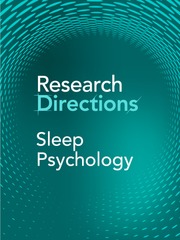The authors regret the inclusion of text errors as detailed below:
Page 1, First Paragraph ‘…The influence of sleep and circadian rhythms on daytime functioning has long been noted. Psychologists and psychology-oriented researchers were among the first to investigate the role of sleep and circadian rhythms in motivation, emotion, cognition, and performance. At the dawn of modern sleep science, psychological fellow, F. B. Dresslar found that telegram tapping speed varied according to time of day providing the first clues to the role of circadian rhythms on performance (Dresslar 1892). Marie de Manacéïne was the first to experimentally demonstrate that sleep was critical to life and that the brain and behaviour were adversely impacted by sleep loss (de Manacéïne 1894). Patrick and Gilbert elaborated on the role of sleep on psychological functioning and were the first to experimentally study the impact of sleep loss in humans (Patrick and Gilbert 1896). The past century has seen an explosion of interest in understanding which aspects of sleep and circadian rhythms relate to which aspects of daytime psychological functioning.…’ should read:
‘…The influence of sleep and endogenous circadian rhythmicity on daytime functioning has long been noted. Psychologists and psychology-oriented researchers were among the first to investigate the role of sleep and circadian rhythms in motivation, emotion, cognition, and performance. At the dawn of modern sleep science, psychological fellow, F. B. Dresslar found that telegram tapping speed varied according to time of day, providing the first clues to the impact of the biological clock on human performance (Dresslar 1892). Marie de Manacéïne was the first to experimentally demonstrate that sleep was critical to life and that the brain and behaviour were adversely impacted by sleep loss (de Manacéïne 1894). Patrick and Gilbert elaborated on the role of sleep on psychological functioning and were the first to experimentally study the impact of sleep loss in humans (Patrick and Gilbert 1896). The past century has seen an explosion of interest in understanding the genetics, the regulation and the dysregulation of circadian rhythmicity, as recognized with the 2017 Nobel Prize in Physiology or Medicine…’




